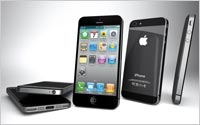 The launch of the iPhone 5 on Wednesday will shake up the smartphone industry and have broader implications for a host of companies from Google to the U.S. major wireless to
Intel, according to JP Morgan analysts.
The launch of the iPhone 5 on Wednesday will shake up the smartphone industry and have broader implications for a host of companies from Google to the U.S. major wireless to
Intel, according to JP Morgan analysts.
Apple is expected to raise the bar for other phone makers with features including a larger screen but thinner body, 4G LTE wireless capability and
longer battery life. Many 4G phones have been criticized for being “pocket hogs” or “battery hogs,” but the new iPhone will avoid those labels. The device, however, is not
expected to incorporate Near Field Communication technology to power mobile transactions or other uses.
“The gap widens in Apple's favor with tomorrow's launch of the iPhone 5,”
said JP Morgan analyst Mark Moskowitz, who hosted the conference call and covers the U.S. IT hardware sector. He expects the better battery performance, a new internally developed Maps app and an
upgraded Siri voice assistant to attract new customers.
The firm anticipates the global rollout of the latest iPhone to be faster and wider than in the past and projects Apple to ship at least
45 million of the devices in the fourth quarter, with about 25 million of those being iPhone 5 handsets. The pricing should stay the same as the iPhone 4S -- starting at $199 for the subsidized 16 GB
model.
The arrival of the iPhone 5 will ripple across the tech landscape. For PC makers like HD and Dell, it signals trouble. Sales of the device will further curb demand for laptops and
desktop computers, as consumers increasingly switch to smartphones and tablets.
When it comes to software, JP Morgan Internet analyst Doug Anmuth highlighted the effect on three companies in
particular: Google, Facebook and eBay.
Google — With Apple replacing Google Maps as the default maps app for iOS 6, Google is expected to lose some usage-related advertising revenue.
While YouTube will no longer be a default app, the new downloadable version of the app for iOS allows Google to begin running advertising in music videos and offer expanded content and a better
experience.
“Google may sacrifice some usage, but overall it will be free of some of those restrictions imposed by Apple and will be able to monetize better,” said Anmuth. Despite
rumors that Apple would also ditch Google search, he expects Google to remain the default search option for the iPhone 5.
Facebook — Deeper integration with iOS 6 will drive greater
engagement by streamlining status updates and social sharing. It won't directly drive revenue for Facebook, but will improve user experience on the device.
eBay — The launch of Passbook, Apple's mobile wallet solution announced in June, will not initially drive
transactions but could move the company into the mobile payments business over time. If Apple were to connect Passbook with its 400 million active iTunes accounts, that could pose a challenge to
PayPal, eBay's digital payments unit.
As for the wireless carriers, the new iPhone is expected to bring a spike in sales. Phil Cusick, who covers the U.S. telecom market for JP Morgan, has
increased his estimate of iPhone shipments for Sprint to 1.75 million from 1.35 million units in the third quarter, and for AT&T, to 4 million from 3 million units. He also upped the forecast for
Verizon Wireless, assuming a Sept. 21 release date for the iPhone 5.
“Depending on carrier availability, we could see some pretty big impacts on carrier numbers this quarter,” said
Cusick. He added that the price of the iPhone 4S would likely be lowered, while U.S. carriers will offer the subsidized iPhone 4 free. The older 3GS will be phased out.
Cusick doesn't expect
the new 4G LTE capability itself to drive consumer upgrades as much as the iPhone 5's other new features. People are still confused about exactly what the difference is between 4G and 3G mobile
service. But to the extent that iPhone users upgrade to the latest handset, carriers will operate 4G networks more efficiently.
The new iPhone also affects various Apple suppliers. Intel and
Advance Micro Devices may suffer from the ongoing erosion of PC sales because of wireless devices, but certain semiconductor makers will gain, such as Analog Devices, Fairchild and Broadcom.